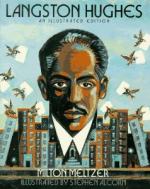|
This section contains 707 words (approx. 2 pages at 400 words per page) |

|
Langston Hughes Summary & Study Guide Description
Langston Hughes Summary & Study Guide includes comprehensive information and analysis to help you understand the book. This study guide contains the following sections:
This detailed literature summary also contains Further Study and a Free Quiz on Langston Hughes by Milton Meltzer.
Langston Hughes has accurately been described as "the Laureate of Black America," and Meltzer's biography is an excellent introduction to his life and work. Hughes's collaboration with Meltzer, first on A Pictorial History of the Negro in America and then on Black Magic: A Pictorial History of the Negro in American Entertainment, led to the development of a solid working relationship that grew into friendship. Hughes recognized that Meltzer's experience in writing and research prepared him for the task of organizing material accumulated over a lifetime, and that Meltzer's essential decency made him an unusually sensitive interpreter of the complexities of race relations in the United States. He felt confident that Meltzer would present his life with fairness and insight when he agreed to Meltzer's request to assist with the writing of a short biography, and he answered Meltzer's questions with as much accuracy as could be expected from a man who has been described as "so private as to conceal his innermost emotions even from himself."
Hughes's sudden death while the project was under way made Meltzer realize that his book would be something of a semiofficial obituary tribute, and although the book is not comprehensive, its concluding chapter offers a concise summary of those aspects of Hughes's life and work that Meltzer especially admired.
The recent publication of the first two volumes of Arnold Rampersad's The Life of Langston Hughes (1986, 1988) has revealed an elusive man even more complex than the portrait in Meltzer's book, but Rampersad's exceptional study has not undermined the essential points that Meltzer makes. In showing the social, familial, and economic pressures Hughes confronted in his quest to become a poet, Meltzer adroitly captures the struggle against constant racial bigotry that all black Americans have faced. Hughes's success as an artist is doubly impressive because of the social obstacles he overcame and because he had little black American literature upon which to draw and few black writers to serve as figures of inspiration.
Since Hughes was born in 1902, his involvement in the major events of the century permits Meltzer to write a historical commentary on the progress of black Americans toward legal guarantees of full constitutional rights from the perspective of a poet who was also an active agent in the struggle, although never a leader. As Meltzer makes clear, Hughes's generally low-key but persistent attempts to address both the artistic and political necessities of black culture represent the kind of quiet strength that contributed as much to the emergence of black consciousness and pride in the 1960s as did the more publicized efforts of other activists.
Hughes's greatest achievements, of course, were as a writer. Throughout his career, he was often neglected by the mass media, which generally focused on only one black literary artist at a time.
Although Richard Wright, Ralph Ellison, and James Baldwin enjoyed more of the spotlight, Hughes's best work has gradually gained recognition as an important element in modern American literature.
His best short stories, such as "On the Road" (1952), have been anthologized, and his poetry, as noted by critic Kenneth Rexroth, was so deceptively simple and clear that it confused academics who felt great poetry had to be ambiguous and obscure. Hughes was part of an American poetic renaissance, not just a black or Harlem renaissance, and his best poems have an enduring interest. His poems encompass both the experimentalism of his contemporaries, such as e. e. cummings and Marianne Moore, and the more popular lyricism of poets such as Robert Frost and Carl Sandburg.
Ultimately, Hughes expressed the psychological condition of black Americans in the twentieth century with a sharp eye, in a language that combines the rhythms of street speech with the elegance of a skillfully crafted formal poem. He was a pioneer in introducing fundamental aspects of black culture to a larger audience. His relationships with writers, musicians, and dramatists demonstrate how artists—always outsiders to an extent—support and inspire each other. For Hughes, this community, and the community of black people, served as a kind of psychological refuge, a "home" of sorts. And from this position of relative security, he opened the way, as Richard Wright has said, for realism and honesty in twentieth-century black literature.
Read more from the Study Guide
|
This section contains 707 words (approx. 2 pages at 400 words per page) |

|



